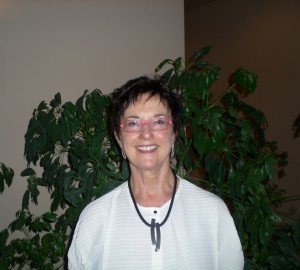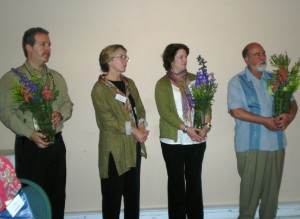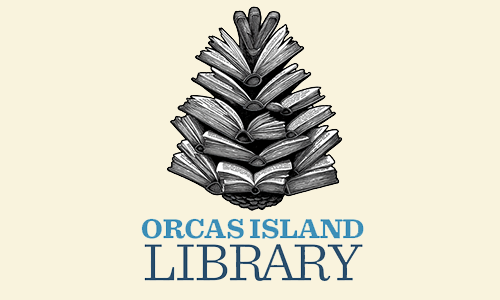
Diane Berreth assumed leadership of the Orcas Island Community Foundation upon President Emeritus Moana Kutsche's resignation this summer
The Orcas Island Community Foundation has passed the $2 million benchmark in its mission “to foster philanthropy to enhance and preserve the quality of life on Orcas Island.”
At its Report to the Community luncheon at Rosario’s Discovery Room on Wednesday, Sept. 8, new Community Foundation president Diane Berreth said, “The remarkable sense of community is a great part of Orcas Island’s beauty.”
She congratulated members of island non-profits, board trustees past and present, and community members for recognizing “the importance of people investing in people,”in the words of the OICF’s 2004 Philanthropist of the Year, Bob Lundeen.
This year the Orcas Island Community Foundation (OICF) changed its recent tradition of acknowledging individual philanthropists (Phyllis and Bob Henigson in 2007, Rachel Adams and Marilyn Anderson in 2008, and Marcia and Bob Waunch in 2009) to focus on “The Impact of Giving: Celebrating $2 Million in Support of the Orcas Island Community.”
Several nonprofit organizations who have been grant recipients displayed storyboards of their organizations’ activities, publicity and literature. Invited speakers were Bruce Coffey on “Celebrating our Community” and Janet Brownell on “Building Organizational Architecture to Support the Future.”
Berreth honored retiring board members: Joe Cohen and Bob Maynard (who were not able to attend the luncheon) and Susan Gudgell, Christopher Peacock, Nanette Pyne and Rick Gould, who were honored with engraved glass vases. She thanked Rosario Resort owners Jerry and Jan Barto for their underwriting support of the luncheon.

Retiring Community Foundation Board Members, from left, Christopher Peacock, Nanette Pyne, Susan Gudgell and Rick Gould
Berreth spoke of Cornerstones, a core of 47 island donors committed to sustained annual contributions. Other “programs and tools” through which $2,039,000 has been given to the Orcas Island Community are:
- Donor Advised Funds, 21 families and groups that contribute funds and advise the Foundation Board on how to distribute them;
- Community Endowment and Partners in Philanthropy, awards given in an annual grant cycle by the community endowment fund and Partners in Philanthropy direct contributions
- Board Initiative Grants, responding to special needs and opportunities, such as those presented by public education, the medical center, and the purchase of Turtleback Mountain.
Berreth referred to the fact that she had assumed presidency of the Community Foundation early, due to the resignation by Moana Kutsche, and acknowledged the help she has received from Hilary Canty, Executive Director of the OICF, and Kutsche.
Canty reviewed the past year: she spoke of the Community Foundation’s fiscal growth and new funds; of a review of investment options, moving funds out of its money market account into laddered certificates of deposit (the review is expected to be completed by the end of next summer); of the initiation of a Community Needs Assessment of the concerns, services, overlays and gaps in eight areas (with the goal to issue findings at the end of the process); and of the work with the Community Food Bank in establishing its board and bylaws, and launching a capital campaign, with the support of the Orcas Island Community Church, for a new facility.
The Food Bank growth was spurred by a $5,000 matching grant, which grew to $13,000, and an anonymous donation of $50,000 towards a building fund for a new facility.
Trustee Bruce Coffey spoke to the gathering, defining philanthropy as “affection for mankind, contributing money, property and work for socially useful purposes.” Social scientists have described altruism as a survival characteristic, but Coffey said, “Maybe it’s as simple as it feels good to give.”
Detailing American philanthropy, Coffey then noted that Orcas Islanders give more than double the per capita average, and also recognized the commitment in volunteer hours given every year. “We’ve built the Orcas Center, the Medical Center, the Band Shell on the Village Green, affordable housing, the Funhouse, the SkatePark, rowing and sailing clubs, schools and preschools, the Food Bank, DV/SAS, the Senior Center, and we bought Turtleback Mountain.”
Coffey cited the 21 donor-advised funds that, through “tax-advantaged giving” have contributed $1.2 million over 15 years. He also mentioned the Community Endowment of $1,000,000 which drives the grants program, supplemented by the Partners in Philanthropy, which have given 175 individual grants over OICF history.
Janet Brownell spoke of the architecture of the Community Foundation, describing it as “solid, supportive and strong.”
She gave examples of the Orcas Island Education Foundation, in partnership with the OICF, establishing the Education Initiative to respond to Bob Henigson’s 2007 challenge to provide long-term reliable community funding for the Orcas Island School District (OISD), with OICF to be the Initiative’s fund supervisor. “There is no reason why we can’t be the best,” Henigson had said when he issued his challenge to the community.
Brownell described how, in the process of assisting the School District, the School Board changed the budgeting process from “rolling forward” projected budgets from year to year, to basing the budget on actual amounts spent, in order to reduce spending – a process that has been emulated by other districts throughout the state.
This year, she noted, the School District has built up a reserve fund of $340,000 and enrollment of over 700 students, including 40 new Orcas Island elementary students alone.
“Foundation – a strong base on which success is built,” Brownell said.
She related how the Endow Orcas program, begun in 2007 to help non-profits succeed by developing endowment funds and “to bring all island non-profits together to learn to be better stewards of the community,” started at a meeting of uncertain, mistrusting non-profit agencies.
Three years later, eight non-profits have achieved “Endow Orcas” status (with two more in the wings), by completing a board-approved Case Statement and drafting a Plan of Action toward specific and measurable organizational endowment goals. Since 2007, these organizations have participated in OICF’s quarterly professional development sessions on endowment and planned giving.
“When you support the Orcas Island Community Foundation, you’re supporting all of us,” Brownell concluded.
**If you are reading theOrcasonian for free, thank your fellow islanders. If you would like to support theOrcasonian CLICK HERE to set your modestly-priced, voluntary subscription. Otherwise, no worries; we’re happy to share with you.**








Great re-cap Margie! One small correction. There are 40 new students to the district in the brick and mortar schools. Several in elementary, but the 40 new children are spread throughout k-12. Those island children represent an almost 10% enrollment increase without taking into consideration the rapid-growing OASIS schools.
Thanks — Janet